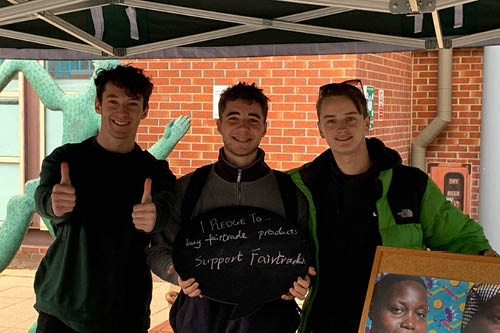In October last year, I visited the Bristol Fairtrade Network to discuss Fairtrade and the Climate Emergency and find out more about how the University of Bristol could become a Fairtrade university. I had never heard of Fairtrade being part of the solution to the climate crisis, but I’m always looking for ways to act on this vital issue. I love the concept of Fairtrade and believe that as consumers we should be more responsible for the impacts of our purchases – Fairtrade empowers us to do just that.
The meeting started off with introductions and ice-breaker facts about the climate emergency. These set the tone for the meeting; the climate emergency is happening right now, and we need to act as soon as possible to prevent disasters affecting all of us. The Global South is feeling the worst impacts of the climate emergency which makes this a justice issue. There was also a great range of people at the meeting – from experts to novices, and even a couple who had travelled from a nearby town for the meeting.
In 2018 the City of Bristol was the first UK local authority to declare a Climate Emergency, and the University of Bristol was the first UK university to announce an emergency last year, with the Bristol’s NHS Trusts and We the Curious following suit. It’s clear that this is an issue that has captured the hearts and minds of Bristol’s residents.
How can Fairtrade be part of the solution to the climate crisis?
Climate change is increasing the vulnerability of farmers across the world to price volatility associated with their products resulting from increasing extreme weather events and weather pattern variability. The Fairtrade programme provides a price premium for farmers to invest in practices which can increase their resilience to the changing climate and decrease their vulnerability to crop failures and price volatility. Premiums can mean a better cash flow amongst farming cooperatives, greater access to credit and the ability to save more easily.The Fairtrade foundation supports projects that encourage climate change adaptation and increase the resilience of farmers. For example, training for farmers is supported, which can include advice on switching to environmentally friendly practices, such as developing nutrient-rich soils that support healthy plants and encouraging wildlife to help control pests and diseases. The promotion of these practices, in turn, encourage sustainable agricultural production.
By supporting the work of Fairtrade and becoming a Fairtrade University, the University of Bristol can support the provision of the price premium to farmers across the world. Recognising the importance of supporting the mitigation and adaptation to climate change beyond the borders of Bristol due to the global nature of the climate emergency, is critical in ensuring a holistic approach to sustainability.
What we are doing as a University
The University of Bristol is working towards becoming a Fairtrade certified University as part of its commitments to address the climate emergency. This year Fairtrade Fortnight runs from the 24 February to the 8 March and the Source Cafes, Halls of Residence, Students’ Union shop and Balloon Bar are all getting involved with promotions and events to highlight how important Fairtrade is. We are putting on an event at the SU Living Room from 12 pm to 2 pm on 27 February to answer any questions and give out Fairtrade samples. For more information on Fair Trade at the University contact sustainability-estates@bristol.ac.uk.
-----------------------------
This blog is written by Emma Lewins from the University of Bristol Sustainability Team.
 |
| Emma Lewins |

